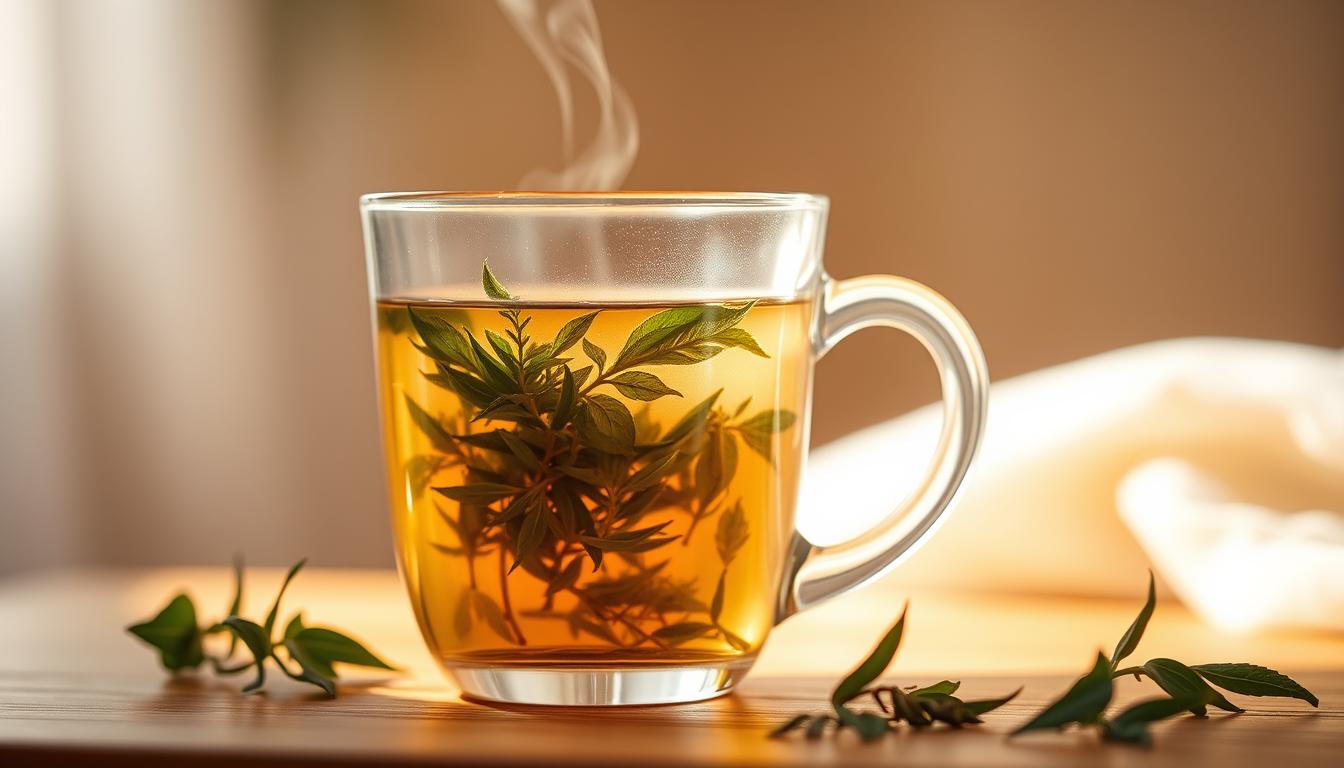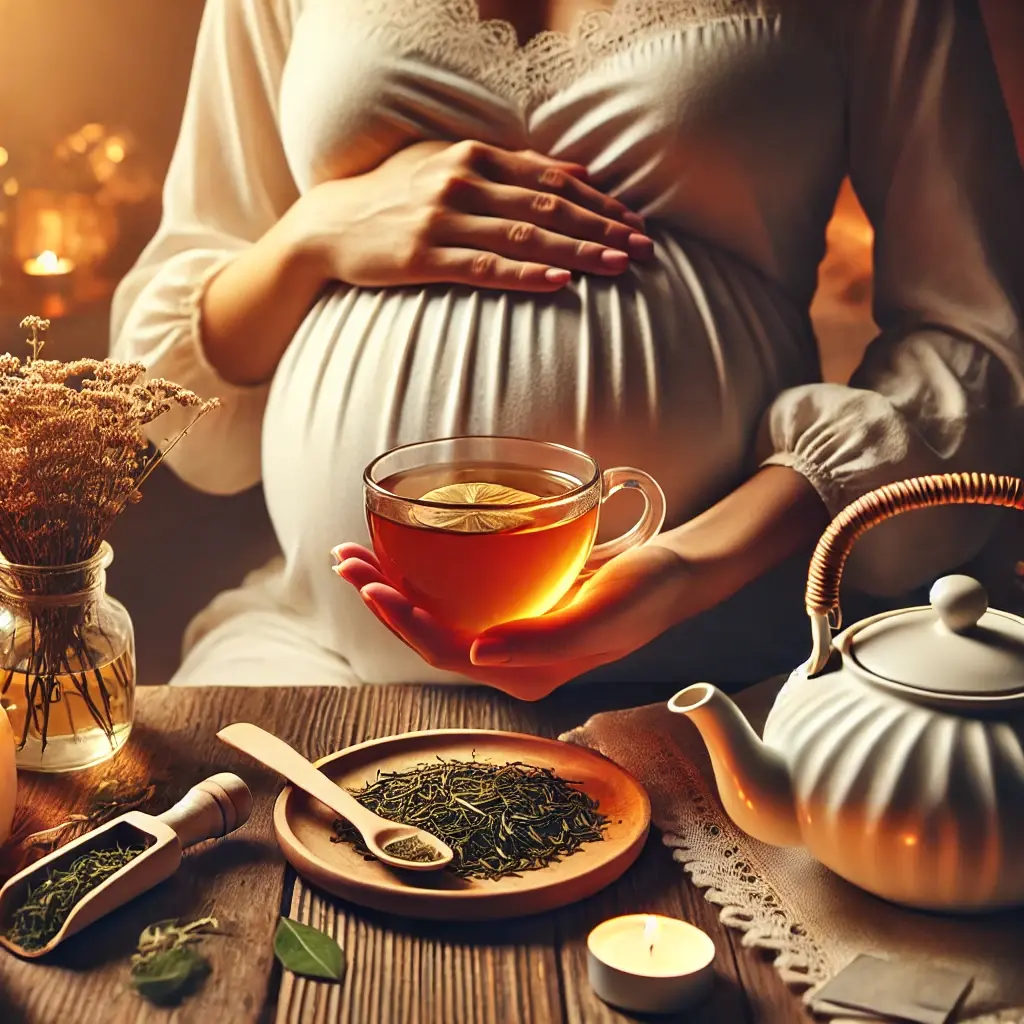Did you know that over 80% of expectant mothers turn to tea as a comforting beverage? Its warmth and variety make it a popular choice. However, not all teas are created equal when it comes to safety for you and your baby.
While many teas are considered a safe drink, it’s essential to be cautious. Caffeine content and certain herbal ingredients can pose risks. For example, chamomile, often used herbal remedy, may not be ideal for pregnancy.
Moderation is key. Replacing high-caffeine beverages with safer tea options can be a smart move. Always consult your healthcare provider to ensure your choices align with your health needs.
Understanding brewing times and tea types can also help you make informed decisions. With the right knowledge, you can enjoy your favorite cup while keeping your baby’s well-being in mind.
Key Takeaways
- Many teas are safe in moderation for expectant mothers.
- Be mindful of caffeine levels in your tea choices.
- Some herbal teas, like chamomile, may carry risks.
- Consult your healthcare provider before trying new teas.
- Brewing time and tea type can impact safety.
Introduction to Tea and Pregnancy Health
For centuries, tea has been cherished for its soothing and health-promoting properties. Whether it’s a traditional brew or an herbal infusion, this beverage offers a range of benefits that appeal to many, especially pregnant women.
Overview of Tea Types and Benefits
Tea comes in many forms, from black and green to herbal varieties like chamomile and peppermint. Each type provides unique advantages. For example, green tea is rich in antioxidants, which can boost immunity. Herbal teas, on the other hand, are often caffeine-free and may help ease common pregnancy symptoms like nausea.

Hydration is another key benefit. Staying hydrated is crucial for both the mother and the baby. Tea can be a flavorful alternative to plain water, making it easier to meet daily fluid needs.
Why Tea Has Become Popular During Pregnancy
Many women turn to tea for its calming effects. The ritual of brewing and sipping a warm cup can reduce stress and promote relaxation. Additionally, certain herbal teas are believed to alleviate morning sickness and improve digestion.
However, it’s important to balance the benefits with potential risks. Some herbal teas contain ingredients that may not be suitable for pregnancy. Always consult a healthcare provider before trying new varieties.
Clinical studies and expert opinions support the idea that moderate tea consumption can be part of a healthy pregnancy diet. By making informed choices, women can enjoy this comforting beverage while prioritizing their health and their baby’s well-being.
Understanding Herbal Teas and Their Effects
Herbal teas have been a go-to choice for many seeking natural remedies and relaxation. Unlike traditional teas, they are made from various plant parts like roots, berries, and leaves. This makes them a unique and caffeine-free option for those looking to enjoy a warm cup of comfort.

What Are Herbal Teas?
Herbal teas, also known as tisanes, are infusions made from plants other than the tea plant. Common ingredients include chamomile, peppermint, and ginger. These herbs are steeped in hot water to create a flavorful and aromatic drink. The process allows the natural properties of the plant to infuse into the water, offering potential health benefits.
Herbal Teas versus Traditional Tea (Black, Green, White)
Traditional teas like black, green, and white come from the Camellia sinensis plant. They contain caffeine, which can vary depending on the type and brewing method. Herbal teas, on the other hand, are naturally caffeine-free, making them a popular choice for those looking to reduce their caffeine consumption.
Here’s a quick comparison:
- Ingredients: Herbal teas use diverse plant parts, while traditional teas use tea leaves.
- Caffeine Content: Herbal teas are caffeine-free; traditional teas contain caffeine.
- Preparation: Both require steeping, but herbal teas often need longer steeping times for full flavor.
Many women choose herbal teas for their soothing properties and natural ingredients. However, it’s important to note that not all herbs are suitable for everyone. Always consult a healthcare provider before making them a regular part of your routine.
What Tea is Safe During Pregnancy
Many expectant mothers find comfort in certain beverages that are both soothing and beneficial. Among these, ginger, peppermint, and green tea stand out as popular choices. Each offers unique advantages while being considered generally safe when consumed in moderation.
Recommended Options: Ginger, Peppermint, Green Tea
Ginger tea is widely known for its ability to ease morning sickness. Studies show that ginger can reduce nausea without increasing the risk of complications. Its natural properties make it a go-to option for many women.
Peppermint tea is another gentle choice. It helps soothe the digestive system, providing relief from discomfort. Its refreshing flavor and calming effects make it a favorite for those looking to unwind.
Green tea, with its low caffeine content, is also a viable option. Rich in antioxidants, it supports overall health. However, it’s important to keep intake within recommended limits to avoid excessive caffeine.
Safe Consumption Levels and Benefits
Moderation is key when enjoying these beverages. For example, limiting green tea to less than three cups a day helps maximize benefits while minimizing risks. Ginger and peppermint teas can be enjoyed more freely, but it’s still wise to monitor intake.
Incorporating these drinks into your routine can be simple. Start your day with a cup of ginger tea to combat nausea. Enjoy peppermint tea after meals for digestive comfort. Sip green tea in the afternoon for a gentle energy boost.
Always consult your healthcare provider to ensure these choices align with your individual needs. With the right approach, you can enjoy these beverages while supporting your health and well-being.
Navigating Caffeine and Its Impact
Caffeine plays a significant role in daily beverage choices, especially for expectant mothers. While it can provide a quick energy boost, managing its intake is crucial for both maternal and fetal health. Understanding how much caffeine is in your favorite drinks can help you make informed decisions.
Caffeine Content in Black, Green, and White Teas
Not all teas contain the same amount of caffeine. For example, black tea has nearly 50 mg per cup, while green tea offers around 30 mg. White tea, known for its delicate flavor, contains the least, with about 15 mg per serving. These variations highlight the importance of choosing wisely.
According to a study, excessive caffeine can lead to complications. Organizations like ACOG recommend keeping daily intake below 200 mg. This means you can enjoy a few cups of tea each day, but moderation is key.
Tips to Stay Within Recommended Caffeine Limits
Here are some practical tips to help you manage your caffeine consumption:
- Track your intake: Keep a daily log of how much caffeine you consume from all sources.
- Opt for lower-caffeine options: Choose white or green tea over black tea when possible.
- Brew for less time: Shorter steeping reduces the caffeine content in your cup.
- Explore alternatives: Herbal teas like peppermint or ginger are naturally caffeine-free.
Research shows that staying within the recommended limits can support a healthy pregnancy. By being mindful of your choices, you can enjoy your favorite beverages without worry.
Herbal Teas to Approach with Caution
Herbal teas can be a comforting choice, but some require extra caution during pregnancy. While many are celebrated for their soothing properties, certain ingredients may pose risks. Understanding which ones to avoid can help ensure a healthy experience for both mother and baby.
Chamomile and Other High-Risk Ingredients
Chamomile is often praised for its calming effects, but it may not be ideal for expectant mothers. Research suggests it could increase the risk of preterm delivery or lower birth weight. Other herbs, like pennyroyal and licorice root, are also best avoided due to their potential adverse effects.
Here’s a quick overview of herbs to approach with caution:
| Herb | Potential Risks |
|---|---|
| Chamomile | Preterm delivery, lower birth weight |
| Pennyroyal | Miscarriage, liver damage |
| Licorice Root | High blood pressure, preterm labor |
Understanding Potential Risks and Side Effects
Certain herbal teas may trigger symptoms like nausea or dizziness, especially in the first trimester. Overconsumption of some herbs could even lead to complications such as miscarriage. It’s crucial to monitor your body’s response and adjust your intake accordingly.
Key risks to be aware of include:
- Increased risk of miscarriage with certain herbs.
- Adverse effects in the first trimester, such as nausea or fatigue.
- Potential long-term effects on fetal development.
The Role of Medical Advice
Always consult your healthcare provider before trying new herbal teas. They can help you understand the specific effects of each ingredient and recommend safer alternatives. Professional guidance ensures your choices align with your health needs and support a healthy pregnancy.
Remember, awareness and moderation are key. While many teas are safe, staying informed helps you avoid unintended side effects and enjoy your favorite beverages with confidence.
Research and Expert Insights on Tea Safety
Research plays a vital role in understanding beverage safety for expectant mothers. Clinical studies have explored the effects of various drinks, providing evidence-based recommendations. These findings help clarify which options are suitable and which should be avoided.
Clinical Studies and Evidence-Based Recommendations
Studies have examined the impact of different beverages on maternal health and birth outcomes. For example, research on raspberry leaf tea suggests it may help tone the uterus, but experts recommend caution in the first trimester. Similarly, studies emphasize the importance of proper water-to-tea ratios and brewing methods to minimize risks.
Key findings include:
- Moderate consumption of certain teas is generally safe.
- Herbal teas like ginger and peppermint are supported by research for their benefits.
- Excessive intake of high-caffeine teas may lead to complications.
Expert Opinions from Obstetricians and Researchers
Board-certified obstetricians and maternal-fetal medicine specialists provide valuable insights. Dr. Jane Smith, a leading researcher, states,
“Evidence-based guidelines ensure that expectant mothers can enjoy their favorite beverages without compromising their health.”
Experts also highlight the importance of monitoring intake. For instance, limiting raspberry leaf tea to the third trimester can reduce potential risks. Staying informed and consulting healthcare providers are essential steps for making safe choices.
By combining research and expert advice, women can confidently navigate their beverage options. This approach ensures both safety and enjoyment throughout their journey.
Practical Tips for a Healthy Tea Routine
Establishing a healthy routine can make a big difference during this special time. By paying attention to your choices, you can enjoy your favorite beverages while supporting your well-being and your baby‘s development.
How to Monitor Intake and Recognize Symptoms
Keeping track of how much you drink each day is a simple yet effective strategy. Use a journal or app to log your consumption. This helps you stay within safe limits and avoid overdoing it.
Be mindful of changes in your body. For example, if your morning sickness worsens or you feel unusually fatigued, it could signal overconsumption. Adjust your routine accordingly and consult your healthcare provider if needed.
Incorporating Tea into a Balanced Pregnancy Diet
Tea can be a wonderful addition to your diet when paired with other nutritious foods. Add a slice of lemon for a refreshing twist and an extra boost of vitamin C. This simple addition enhances flavor and benefits.
Here are some tips to balance your intake:
- Pair tea with meals rich in protein and fiber for sustained energy.
- Alternate tea with water to stay hydrated throughout the day.
- Choose caffeine-free options like herbal blends to avoid overstimulation.
By following these steps, you can create a routine that supports your health and prepares you for labor. Remember, moderation and awareness are key to a smooth and enjoyable journey.
Conclusion
Making informed choices about beverages can enhance your well-being during this special time. Many options, like peppermint tea and certain leaf tea varieties, are considered safe when consumed in moderation. These drinks can offer relief from nausea and provide a comforting ritual.
However, it’s essential to prioritize moderation and proper selection. Always consult your healthcare provider to ensure your choices align with your individual needs. By following expert advice and staying mindful of your intake, you can enjoy your favorite beverages responsibly.
Remember, a balanced approach supports both your health and your baby’s development. With the right knowledge, you can savor each sip with confidence and peace of mind.

